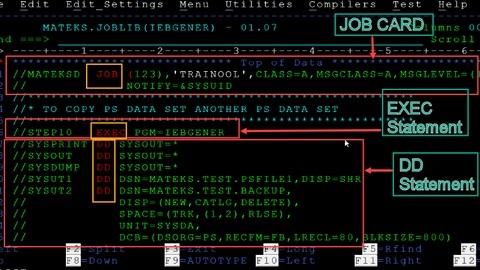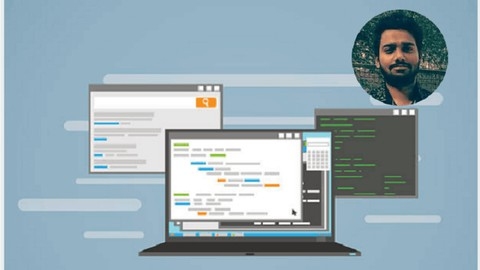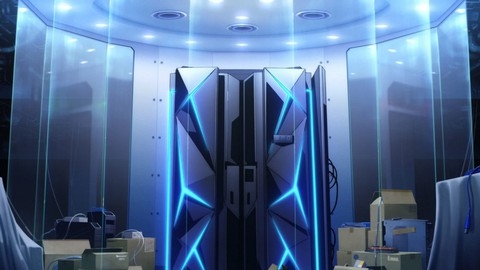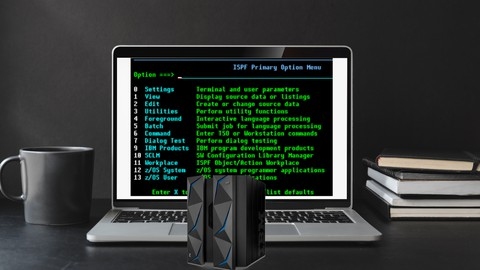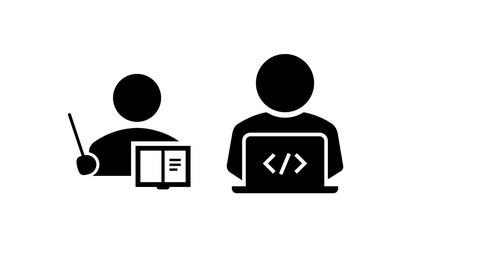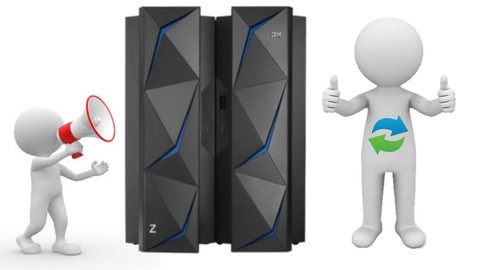Job Control Language (JCL) is the command language used on IBM mainframe operating systems to instruct the system on how to run a batch job or start a subsystem.
It’s a critical skill for anyone working with mainframe systems, enabling you to manage and execute programs, manipulate data, and control system resources effectively.
Mastering JCL unlocks opportunities in various mainframe-related roles, offering a pathway to a stable and rewarding career in a field that continues to power crucial operations for many organizations worldwide.
However, finding the right JCL course on Udemy that fits your learning style and experience level can be challenging.
You want a comprehensive course that covers both the fundamentals and advanced concepts, with practical examples and exercises to solidify your understanding.
Sifting through the numerous options available can be time-consuming and leave you unsure of which course will best equip you with the JCL skills you need.
Based on our research and analysis, we believe the Mainframe: The Complete JCL Course from Beginner to Expert is the best JCL course on Udemy overall.
This course provides a thorough and engaging learning experience, guiding you from the basics of JCL syntax to advanced topics like GDGs and procedures.
The hands-on approach, including setting up a mainframe environment on your own computer, ensures you gain practical experience and confidence in using JCL.
However, this is just one of the many excellent JCL courses available on Udemy.
We’ve compiled a list of top recommendations catering to different learning preferences and skill levels.
Continue reading to explore these options and find the perfect JCL course to launch your mainframe journey.
Mainframe: The Complete JCL Course from Beginner to Expert
This course takes you on a journey from JCL novice to confident user.
You will start by transforming your own computer into a Mainframe environment, connecting to an MVS 3.8 system.
You will quickly grasp the fundamentals of JCL and how it commands jobs and programs within the Mainframe world.
You will become comfortable with key JCL statements such as JOB, EXEC, and DD, understanding their roles in program execution.
You will then dive into the practicalities of JCL coding, exploring a range of essential parameters.
You will learn how to use parameters like CLASS, MSGCLASS, and MSGLEVEL to manage job classes and messages.
You will discover how to control job flow with parameters like TYPRUN and PRTY, and you’ll understand how to manage job restarts and notifications using parameters like RESTART and NOTIFY.
You will also learn how to use the PGM parameter to specify the program to execute and how to control program resources using the REGION parameter.
The course then unveils advanced JCL concepts, introducing you to GDGs.
You will master the art of creating, managing, and deleting these powerful datasets, gaining proficiency in handling generations of data.
You will become adept at manipulating datasets through parameters like DSN and DISP, understanding how to allocate storage with the SPACE parameter.
You will explore concepts like UNIT and VOLUME, delving into the intricacies of dataset storage.
You will then uncover the power of libraries in the Mainframe environment, understanding the roles of JOBLIB, STEPLIB, JCLLIB, and COPYLIB in managing and executing JCL programs.
You will also learn how to install and utilize the ZOS operating system on a Hercules emulator.
This hands-on experience will provide a deeper understanding of the Mainframe ecosystem, giving you the confidence to tackle real-world scenarios.
The Complete Job Control Language (JCL) Course.
This JCL course prepares you to manage and execute batch jobs on mainframe systems.
You will learn the basics of JCL, including batch processing, JCL syntax, and statements like JOB, EXEC, and DD.
You will discover how to define datasets, work with Generation Data Groups (GDGs), and manage libraries like JOBLIB, STEPLIB, and JCLLIB.
You will even run your first JCL programs and understand return codes using tools like SDSF and OUTLIST.
You will then explore advanced concepts like conditional processing using the COND parameter and IF statements to control program flow.
You will use powerful utilities like SORT, IEBCOPY, and IEHPROGM for data manipulation and management.
For example, you can use SORT to combine datasets with JOINKEYS or split datasets based on specific conditions with OUTREC.
You will also learn how to transfer files between your personal computer and the mainframe using tools like c3270 terminal emulation.
This JCL course doesn’t just cover theory; it provides practical skills.
You will learn to connect to a company’s mainframe, allocate datasets for your JCL, and use utilities like IEBCOMPR to compare datasets and IEBGENER to copy and merge datasets.
You will become proficient in using JCL for real-world tasks like managing and manipulating data on mainframe systems.
Finally, you will learn how to set up a mainframe environment on a Raspberry Pi, known as a Mainframe Pi.
This exciting opportunity allows you to experiment with MVS, connect remotely using VNC, and gain a deeper understanding of mainframe environments.
The course also guides you through installing and running MVS on Windows and Ubuntu operating systems.
Mainframe JCL Developer-Support Training BY Anil Polsani
This Mainframe JCL Developer-Support training teaches you the basics of mainframe development, starting with the difference between batch and online processing.
You will learn how COBOL works within the mainframe environment and master the essentials of Job Control Language (JCL).
You will learn to control how your programs run by working with JOB, EXEC, and DD statements.
The course then delves into JCL utilities, including the Sort Utility for data management, and the GDG concept, which helps manage large datasets.
You will explore the power of JCL procedures, known as PROCs, learning how to define, use, and override them to automate your tasks.
You will gain practical skills in understanding and addressing those pesky production abends, the error situations that can occur in JCL jobs.
These skills are essential for anyone working in a mainframe environment.
Finally, you will explore JCL parameters and how to override them, giving you control over your JCL jobs.
JCL Course: The Ultimate Guide to Job Control Language.
This JCL course equips you with the fundamentals of Job Control Language (JCL) for seamless operation in mainframe environments.
You will start with the basics of mainframe architecture, learning about crucial components like z/OS, ISPF, and SDSF.
You will also grasp the intricacies of working with datasets and files, mastering the distinction between batch and online processing.
The course delves into the core of JCL, guiding you through JCL statements such as JOB, EXEC, and DD.
You will discover the power of symbolic parameters and procedures, learning to write your own JCL code and streamline your workflow using procedures.
You’ll discover how to write efficient JCL code, utilizing procedures for optimized task execution.
This course doesn’t just stop at the basics.
You will explore conditional processing techniques, acquiring valuable skills for refining your JCL code.
The course arms you with practical tips and tricks, showing you how to leverage parameters like COND, TIME, REGION, and TYPRUN for enhanced job control.
You will then venture into the world of JCL utilities, mastering tools like IEFBR14, IEBGENER, IEBCOPY, IEBCOMPR, and the powerful SORT utility, gaining proficiency in data manipulation tasks.
Finally, the course delves into the intricacies of VSAM (Virtual Storage Access Method), familiarizing you with KSDS, ESDS, RRDS, and LDS datasets.
You will learn to navigate the IDCAMS utility for efficient VSAM dataset management.
Learn Complete Mainframe JCL - Basics to Advanced Topics
You begin with the basics, learning how to structure your JCL code, use essential keywords like PRTY to prioritize jobs, and manage how messages are handled with MSGCLASS.
You then dive into using powerful statements like EXEC to run programs and DD to define your datasets, specifying attributes like how much SPACE they need.
The course introduces you to IBM utilities, your tools for managing data on the mainframe.
You’ll learn to use IEBGENER for straightforward data copying, IEBCOPY for more complex operations like compressing data, and how to create and utilize GDGs to organize different versions of your files.
You’ll discover how to make your JCL smarter by using IF statements to create conditional logic, giving your jobs the flexibility to handle different scenarios.
You’ll also learn how to use RESTART to pick up processing from where it left off, a lifesaver for those times when things don’t go as planned.
You’ll become proficient in using SORT, a powerful utility that allows you to order and manipulate data within your datasets.
You’ll master techniques for sorting data in ascending or descending order, selecting specific records, removing duplicates, and much more.
Finally, the course introduces you to SDSF, your command center for interacting with the mainframe.
You’ll use SDSF to submit your JCL jobs, monitor their progress, and troubleshoot any issues.
You’ll also discover how to manage your job queues and analyze job output using SDSF.
JCL : JOB Control Language - Mainframe ZOS
This JCL course equips you with a solid foundation in mainframe programming.
You’ll begin with the basics of JCL, learning how to write and submit your first jobs.
The IEFBR14 utility will become a familiar tool as you understand JCL statements and parameters, including the JOB statement and the DISP parameter.
You’ll gain hands-on experience creating sequential files and learn the nuances of positional and keyword parameters.
You’ll discover how to create a PDS, a fundamental element for data storage.
The course delves into the IEBGENER utility, enabling you to move data efficiently between datasets.
You’ll master the DISP parameter with its various values such as SHR, OLD, and MOD, which dictate how data is accessed and updated.
DFSORT, a powerful tool for data manipulation, will become a valuable asset in your skillset.
You’ll learn to sort, merge, and join datasets.
The course covers concepts like joins and non-matching records, giving you a comprehensive understanding of data manipulation techniques.
You’ll explore ICETOOL and temporary datasets, essential for managing transient data within your JCL programs.
You’ll then dive into the COND parameter, learning to control job execution based on conditions like return codes.
You’ll become proficient in analyzing syntax, MAXXCC, and abends.
The course then focuses on procedures, both instream and cataloged, teaching you how to create reusable JCL code.
Finally, you’ll discover Generation Data Groups (GDGs), a powerful concept for managing datasets.
You’ll learn how to create and utilize GDGs, a crucial skill for handling data in a mainframe environment.
Mainframe 5 Modules - TSO/ISPF, JCL , VSAM, SDSF, Z/OS-UNIX
You’ll begin by exploring the core components of a mainframe, understanding its significance across various industries, and discovering the career opportunities this field offers.
The course then guides you through TSO/ISPF, the mainframe’s user interface.
You’ll learn to navigate this interface, manage files, and execute tasks like copying, deleting, and renaming datasets.
The course will even teach you how to create a PDS and its members, essential for organizing and storing your code.
Next, you’ll delve into JCL, the language that directs program execution on the mainframe.
You’ll learn how to write and identify JCL statements, understand the different types of parameters, and work with common IBM utilities like IEFBR14, IEBGENER, and IEBCOPY.
You’ll also master the art of creating and managing GDGs, a crucial skill for managing different versions of your files.
The course doesn’t neglect other essential mainframe tools and concepts.
You’ll discover SDSF, a tool that allows you to monitor and manage your mainframe jobs, and VSAM, a powerful file management system.
You’ll learn how to use IDCAMS to create and manage different types of VSAM files, such as KSDS, ESDS, and RRDS.
Finally, you’ll be introduced to Z/OS UNIX, learning how to navigate its file system and transfer data between the mainframe and UNIX environments.
